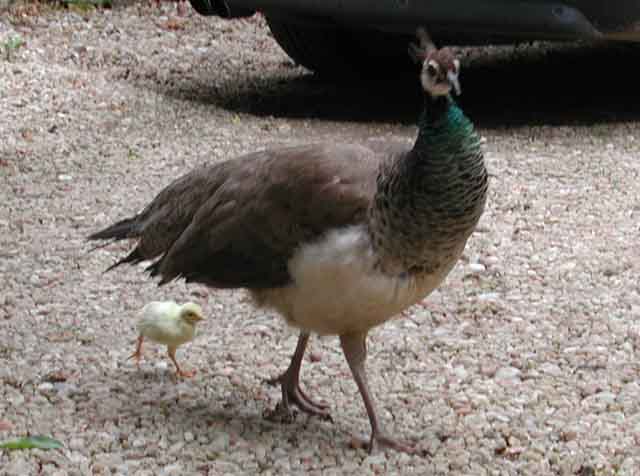
Peafowl
We have a small family of peacocks who live in the garden. The use of the verb "own" would be wholly inappropriate since peacocks have no concept of ownership and usually behave as if we co-habit with them in their garden! They do however appreciate peanuts, and a regular supply does appear to cement the relationship. They eat quite well enough in almost any garden, and they sleep in the trees. (Yes, they do fly, but take off at a rate of climb reminiscent of a fully-laden Lancaster bomber!).
We started 2003 with three: A male who wandered by one day a few years ago and stayed, and two females who we bought a couple of years ago to keep the male company. Like humans, the males are happiest in groups with an excess of females: For those of you interested in trivia, a ratio of 2:3 is regarded as optimal. If you try an keep an excess of males, some (or all) will move on (which is probably why ours arrived).
During the summer, the elder of the two females decided to nest, and after disappearing for a few weeks, she reappeared with two little chicks. Her nest was on the ground behind one of the large trees, and the females stay on the nest all the time apart from two ten-minute feeding breaks per day.
Unfortunately one of the chicks got run-over when only two days old, but the other one appears to have a better working knowledge of the Blue Cross Code!
4 day-old peachick with proud mum. (2nd August 2003).
Marcus named the peachick "James Hammer", but this is probably inappropriate since the chick turned out to be female! (It is impossible to tell the gender for the first few weeks).
The second female decided to nest soon afterwards, but chose a spot in the middle of a flower-bed. This was probably not such a wise choice since she disappeared soon afterwards, never to be seen again. It is probable that a fox (or similar predator) ate well that night. There were three eggs in the nest, but they were stone cold by the time we realised the peahen was missing.
We therefore now have a family of three: Mum, Dad and daughter. We are especially proud that the chick has survived, since survival in the wild is a relatively rare occurrence. Peafowl are easy to breed if you take the eggs away from the nest and incubate them in protected runs under hens, but they tend not to survive if bred in the open.
The peachick is lighter then her mother because she is still juvenile and also because Dad is a Black Shouldered peacock (a variant of the blue), and they tend to have paler chicks.
Peachick with Mum, 7 weeks old (October 2003).
Family photograph (bribed with peanuts), 19th December 2003.
The pea-family wish you all a Merry Christmas and a Happy New Year, and if you are passing, could they please have some peanuts?